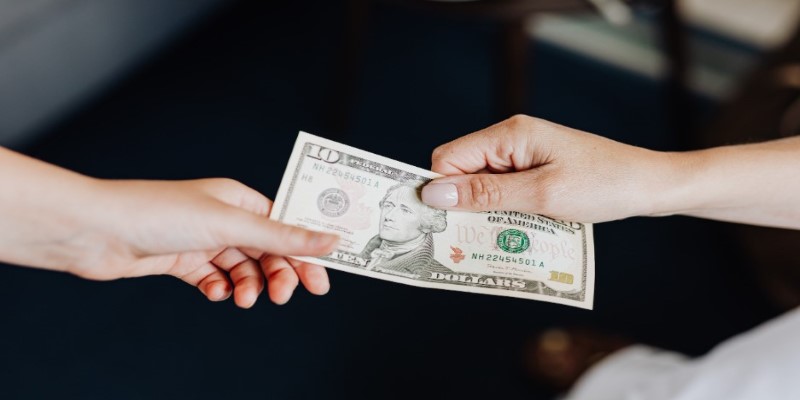Traveling to a new country often involves the excitement of exploring different cultures and meeting new people. However, cultural differences can sometimes lead to misunderstandings. One common area where such differences become evident is in money practices. In the United States, certain behaviors regarding money are routine and generally accepted.
Yet, these same actions can be considered rude or offensive in other cultures. In Thailand, a country known for its rich traditions and unique customs, some familiar money practices from the US are seen in a negative light. Understanding these differences is crucial for respectful travel and positive interactions.
The Thai Approach to Money Handling
In Thailand, money holds significant cultural importance beyond its transactional role. Thais approach money with a deep sense of respect and reverence, reflecting their broader cultural values. This respect is evident in how money is handled, presented, and received. For example, it is customary to use both hands when exchanging money, showing attentiveness and politeness.

Gestures such as pointing at money or placing it on a counter can be seen as disrespectful. These practices are rooted in the cultural emphasis on maintaining dignity and avoiding actions that could be perceived as careless or rude. Respecting these norms is crucial for positive interactions in Thailand.
Handing Money with One Hand
In the US, it is common to hand money over using just one hand. This practice is usually done casually and without much thought. However, in Thailand, this can be perceived as disrespectful. Thais often use both hands when exchanging money, especially in more formal or respectful situations. Using two hands is seen as a sign of respect and attentiveness. Therefore, handing money with only one hand might come off as careless or dismissive.
Pointing at Money
Another common practice in the US is pointing to money, whether in a cash register or while showing a bill. In Thailand, pointing at money is considered impolite. The act of pointing at something, particularly money, is seen as a sign of disrespect or a lack of regard for the person with whom you are interacting. Thais prefer that money be handled smoothly and with discretion, avoiding any gestures that could be interpreted as rude.
Placing Money on the Counter
In many US establishments, it is customary to place money on the counter when paying for a service or a product. This can be done in a hurry or as a casual gesture. In Thailand, however, placing money on the counter can be seen as a lack of respect for the person receiving it. Instead, Thais appreciate it when money is handed directly to the cashier or service provider, preferably using both hands. This small act demonstrates politeness and shows that you value the person serving you.
Handling Money in Front of Others
In some parts of the US, it is common to count money in front of others, especially when making a payment. This practice might be seen as a sign of transparency or an effort to ensure accuracy. However, in Thailand, counting money in public or front of others can be considered disrespectful. It might be interpreted as a lack of trust or as showing off one's financial status. In Thai culture, it is more appropriate to handle money discreetly and privately.
The Cultural Context Behind These Practices
Understanding why these practices are viewed as offensive requires a glimpse into Thai cultural values. Thailand, like many countries, has deeply rooted customs that influence everyday interactions. Respect and politeness are central to Thai culture. The concept of "saving face" is crucial, meaning that individuals strive to maintain dignity and avoid embarrassment. Actions that might cause someone to lose face, such as appearing careless with money, are avoided.
Additionally, Thai Buddhism plays a significant role in shaping cultural attitudes towards money. Buddhism teaches values of moderation and humility, which influence how Thais interact with money and each other. Therefore, practices that seem casual or indifferent to money in the US might clash with these values in Thailand.
How to Avoid Offending Locals?
To show respect and avoid offending locals in Thailand, follow these simple guidelines:
Use Both Hands
When handling money, always use both hands. This practice demonstrates respect and consideration for the person you're interacting with. Its a sign of politeness that aligns with local customs and helps make a positive impression.
Avoid Pointing

Avoid pointing at money or other items during transactions. Pointing can be seen as rude or disrespectful. Instead, handle money discreetly and smoothly to prevent drawing unnecessary attention.
Hand Money Directly
Always give money directly to the cashier or service provider, rather than placing it on the counter. This small gesture of politeness can greatly influence how your actions are perceived and show that you value the person you're dealing with.
Be Discreet with Money
Handle and count your money privately, away from public view. This approach respects Thai cultural norms and avoids any unintended disrespect. Keeping money dealings discreet helps maintain a positive interaction and shows consideration for local customs.
Conclusion
Navigating cultural differences can be challenging, but it also offers opportunities for growth and understanding. By being aware of how common money practices in the US might be viewed in Thailand, travelers can ensure they are showing respect and consideration. In Thailand, money is treated with a level of reverence that reflects broader cultural values of respect, politeness, and humility.
Simple behavioral adjustments, such as using both hands to handle money and avoiding public displays, can help bridge cultural gaps and lead to more positive interactions. Understanding and respecting these differences not only enhances travel experiences but also fosters greater appreciation for the diverse ways people live around the world.




